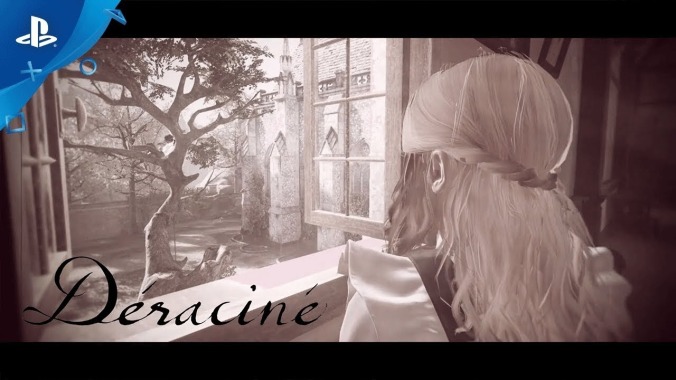FromSoftware's new PSVR ghost story, Déraciné, wants to hurt you as badly as Dark Souls ever did
Games Reviews Déraciné
Déraciné is a small game. Or maybe “intimate” is a better word; unlike FromSoftware’s multi-million-dollar Dark Souls franchise, which elevated the studio (and director Hidetaka Miyazaki) from quirky cult favorite to superstar status, there are no doomed gods on display here, no cursed warriors bringing down demons and dragons with bravado and blade. But despite that tininess of scale—six orphans, one school, and only the barest hints at the darkness that lurks beyond its walls—the studio’s new Playstation VR exclusive sees Miyazaki return to the same poignant themes that have lent a deeper mystery to so many of his celebrated hack-and-slashers: regret, memory, and the human tendency to curse ourselves to repeat the cycles and mistakes of the past.
That being said, those who know FromSoftware exclusively from its Souls games will have the most adjustment to do if they want to catch onto Déraciné’s wavelength; rather than the blood-soaked manga that served as the inspiration for those earlier games, this new title is best understood, quite literally, as a fairy tale, with the player taking on the role of an unseen companion to a school’s worth of cheerful, stereotypical orphans. (There’s the nerdy kid, the protective older boy, the injured little girl, etc.) Invisible, and trapped in a series of singular moments in time, you flit around the campus like a friendly ghost, examining objects, watching memories, and occasionally intervening to solve a few light puzzles. Mostly, you’re getting to know the kids, who—despite their easy character descriptors, and their tendency to speak in the same elliptical, slightly enigmatic speech patterns familiar from so many Souls NPCs—have a lightness to them that makes it easy to embrace the preciousness of the premise. Or at least enough to care about what happens to them when things—inevitably—take a turn for the dark.
The other contingent of diehard From fans likely to struggle here, meanwhile, are the ones who can’t play the game at all, because they don’t have the expensive hardware peripherals it somewhat inexplicably requires. From a design point of view, that frustration is understandable, because there’s nothing fundamentally separating Déraciné from, say, one of the later installments in the Myst series, as you click around the school, move the camera to examine the environment, and then teleport forward to the next viewable node. The VR adds to the experience, to be sure; the unnamed school feels far realer than it otherwise might, and the inescapability of the experience helps the game’s few moments of outright horror induce the proper sense of paranoia and fear. But there’s nothing here that screams “killer app,” especially since a number of games—including last year’s The Invisible Hours, which operated both in and out of VR mode—have already made use of its “move through a frozen moment of time” conceit.
What it does have is a story that tells itself in gently worsening layers, as the kids entreat their “kind faerie”—whose timeless existence allows for a certain amount of “set right what once went wrong” shenanigans—to undo the miseries of the past. (Never their own, mind you; one of the game’s more truthfully dispiriting notes is that when people tamper with the natural order, its to help those they love, not themselves.) The storytelling will be familiar to those who’ve spent much time with From’s past work, telling itself through bit and pieces, item descriptions, and the spaces where questions are intentionally left blank. Some details of the game’s plot are concrete; others, at least, can be guessed at. But a few linger in the memory like open wounds, teasing at the brain and demanding frequent returns, in the memory, if not in the game itself. That’s fitting, since, in what might be the game’s darkest moment, you eventually learn that, for once, it’s not some encroaching existential darkness or maddened god that’s causing the world’s suffering; just the human impulse to over-examine the past, and wish things were better than they ever actually were.
Looked at as a whole, there’s something defiantly refreshing about how brazen a departure Déraciné is from Miyazaki and his team’s flashiest, most cash-catching work. It’s a deliberate throwback to a time when FromSoftware was the oddball developer behind games like Kings Field and Echo Night, rather than the brand ambassadors for “Git Good” video game masochism, and it foregrounds the persistent melancholy that’s helped the studio’s bloodier games be more than just a series of playable heavy metal album covers. It is, in its own way, no less brutal, though, as it asks you to care about its young, oh-so vulnerable characters, as you watch from the ghostly sidelines and wait for that other shoe to drop on them—over and over again.